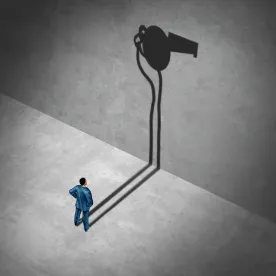Increase in Reports of Financial Statement Fraud
In July 2010, Congress passed the Dodd-Frank Act, which established the SEC Whistleblower Program. The program offers monetary awards to individuals who expose wrongdoing (details below). A decade later, the program has proven to be a critical tool in the SEC’s enforcement arsenal to identify and halt fraud – especially financial statement fraud. Since 2013, the most common whistleblower tip reported to the SEC relates to violations or fraud in connection with publicly traded companies’ financial statements and other accounting issues. In fact, from 2013 to 2019, the number of tips related to financial statement fraud has nearly doubled – from 557 tips to 1,107 tips.
The SEC does not disclose details about whistleblowers’ tips (only the general category of the tips). However, recent SEC enforcement actions shed some light on the potential accounting violations disclosed in the tips, which include:
-
Concealed liabilities and expenses;
-
Improper asset valuations;
-
Improper disclosures; and
For examples of these SEC enforcement actions, click here.
SEC Whistleblower Program
In exchange for these tips, whistleblowers may be eligible for substantial monetary awards. Under the SEC Whistleblower Program, the SEC issues awards to eligible whistleblowers who provide original information about violations of the federal securities laws, including financial statement fraud. When information provided leads to enforcement actions with total monetary sanctions in excess of $1 million, a whistleblower may receive an award of between 10 and 30 percent of the total monetary sanctions collected. In certain circumstances, even auditors and accountants may be eligible for awards under the program.
The SEC Whistleblower Program also protects the confidentiality of whistleblowers and does not disclose information that might directly or indirectly reveal a whistleblower’s identity. Whistleblowers can even submit a tip anonymously to the SEC if represented by an attorney in connection with their tip.
SEC Whistleblower Awards
Since 2012, the SEC Whistleblower Program has issued more than more than $450 million in awards to whistleblowers. The largest SEC whistleblower awards to date are $50 million, $39 million and $37 million. See some of the SEC whistleblower cases that have resulted in multi-million dollar awards.
Financial Statement Fraud Amid the Coronavirus Pandemic
As a result of the coronavirus pandemic, many companies have struggled to meet financial projections and forecasts. During these times of economic turmoil, there is often added pressure on companies to make the numbers. When plans fail to materialize, companies may be tempted to make up the numbers.
In an April 3, 2020 speech and March 12, 2020 webinar, the SEC’s Chief Accountant warned of significant accounting challenges as a result of the coronavirus pandemic. In particular, the Chief Accountant highlighted concerns related to the following areas of accounting:
-
Deceptive non-GAAP metrics;
-
Fair value and impairment considerations;
-
Leases;
-
Debt modifications or restructurings;
-
Hedging;
-
Revenue recognition;
-
Income taxes; and
-
Subsequent events.
The Chief Accountant also warned that companies may try to use the pandemic to cover up past errors or fraud. Whistleblowers can assist the SEC root out financial statement fraud by reporting to the SEC Office of the Whistleblower.
How to Report Financial Statement Fraud
To report financial statement fraud or other violations of the federal securities laws and qualify for an award under the SEC Whistleblower Program, the SEC requires that whistleblowers or their attorneys report the tip online through the SEC’s Tip, Complaint or Referral Portal or mail/fax a Form TCR to the SEC Office of the Whistleblower.
Prior to submitting a tip, whistleblowers should consult with an experienced whistleblower attorney and review the SEC whistleblower rules to, among other things, understand eligibility rules. As noted, compliance personnel, gatekeepers, and other corporate insiders may be eligible for awards in certain circumstances. If whistleblowers are uncertain about their eligibility, they should consult with an experienced SEC whistleblower attorney. A skillful analysis may be the difference between a multimillion-dollar whistleblower award and no award at all.




 />i
/>i

